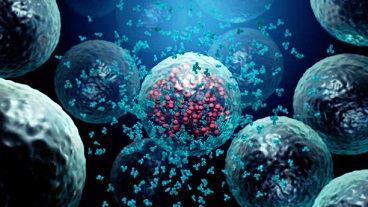BREAKING! Scientists From La Jolla Institute for Immunology Discover New Subsets Of CD4+ 'Helper' T Cells
Source: Immunology Feb 27, 2022 3 years, 11 months, 2 weeks, 18 hours, 38 minutes ago
Scientist from La Jolla Institute for Immunology-California-USA have discovered new genes in CD4+ "helper" T cell subset that are linked to risk of autoimmune diseases.
 Credit: Istock
Credit: Istock
In
immunology, T cells play are extremely important as they play a critical role in helping to fight infections and cancers and they can also drive autoimmune diseases.
However, the impact of genetic variants on cells challenged in biologically relevant contexts has not been fully explored.
The study team activated CD4+ T cells from 89 healthy donors and performed a single-cell RNA sequencing assay with >1 million cells to examine cell type–specific and activation-dependent effects of genetic variants.
Single-cell expression quantitative trait loci (sc-eQTL) analysis of 19 distinct CD4+ T cell subsets showed that the expression of over 4000 genes is significantly associated with common genetic polymorphisms and that most of these genes show their most prominent effects in specific cell types.
Importantly these genes included many that encode for molecules important for activation, differentiation, and effector functions of T cells.
The study team also found new gene associations for disease-risk variants identified from genome-wide association studies and highlighted the cell types in which their effects are most prominent.
Interestingly the study team also found that biological sex has a major influence on activation-dependent gene expression in CD4+ T cell subsets. Sex-biased transcripts were significantly enriched in several pathways that are essential for the initiation and execution of effector functions by CD4+ T cells like TCR signaling, cytokines, cytokine receptors, costimulatory, apoptosis, and cell-cell adhesion pathways.
Overall, this DICE (Database of Immune Cell Expression, eQTLs, and Epigenomics) subproject highlights the power of sc-eQTL studies for simultaneously exploring the activation and cell type–dependent effects of common genetic variants on gene expression (
https://dice-database.org).
The study findings were published in the peer reviewed journal: Science Immunology.
https://www.science.org/doi/10.1126/sciimmunol.abm2508
The study team have uncovered major differences between donors based on genetics and how the cells may function in men and women.
In order to fuel further research into human immunity, the study team had created a free online resource for other immunologists around the world who want to investigate the data sets in real-time, download and use their data.
This public data sharing is part of the La Jolla Institute-hosted Database of Immune Cell Gene Expression, Expression quantitative trait loci (eQTLs) and Epigenomics (DICE).
Study leader Professor Dr Pandurangan Vijayanand, M.D., Ph.D., a member of the La Jolla Institute Center for Autoimmunity and Inflamma
tion and Center for Cancer Immunotherapy told Thailand
Medical News, "This investigation expands our DICE resource to help scientists find target genes and cell types linked to risk of human diseases."
First author Dr Benjamin Schmiedel, Ph.D., an instructor at La Jolla Institute added, "These cells are critical for protecting the body, and we uncovered many new genes that are linked to risk of human diseases."
The study finding gives the scientific community the most in-depth and complete look yet at differences in gene expression between CD4+ T cell subsets.
The study team used a method called single-cell RNA sequencing to compare differences in gene expression in more than a 1 million CD4+ T cells from 89 healthy blood donors.
As a result of T cells playing many roles in the body, such as "remembering" past invaders and alerting other immune cells, the study team expected to find strong differences between cell subsets.
In fact, they set out hoping to gain insights regarding eight pre-defined CD4+ T cell subsets they'd investigated in a 2018 Cell study.
In past research, the study team had investigated various T cell subsets isolated from blood samples without stimulating them.
However, for this new study, the study team activated the T cells before sequencing and analysis. This step allowed the researchers to mimic how the cells would respond when called upon to fulfill their role and protect the body from infection.
Dr Schmiedel added, "Stimulating the cells is like turning on the light, suddenly you can understand the function of these cells much better."
The study findings shed a light on known cell subsets and revealed additional, little-understood subsets.
Dr Schmiedel explained, "Why do these cells have different features? There is no information in the literature to help us understand what those cells are, so that's something we want to follow up on."
The study team had already learned more about these T cells by performing single-cell expression quantitative trait loci (sc-eQTL) analyses. This technique showed them which genes are affected by genetics and had the most profound effects across the different T cell subtypes.
Interestingly, the study team also spotted major sex-based differences in how the T cells worked. In comparing the cells of people assigned either male or female at birth, the study team found variations in how the various CD4+ T cell subsets may communicate with other immune cells and how they produced disease-fighting cytokines. Biological sex turned out to be an important factor in how these cells do their jobs.
Importantly these differences could help explain why men are more prone to infectious diseases, such as COVID-19, or why women are more vulnerable to autoimmune diseases.
Dr Schmiedel added, "If we can understand how an immune cell from a woman differs from an immune cell from a man, we could figure out why certain diseases affect one sex more often than another."
For the latest on
Immunology News, keep on logging to Thailand Medical News.
